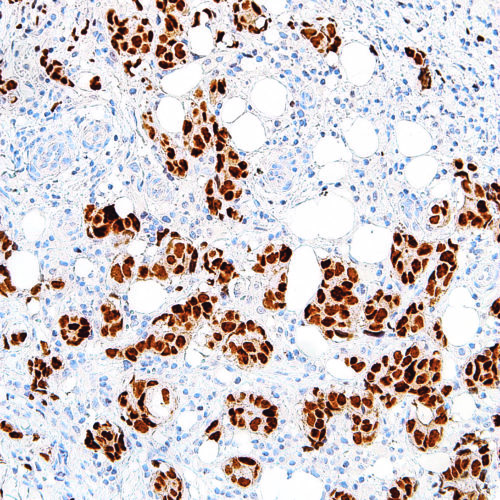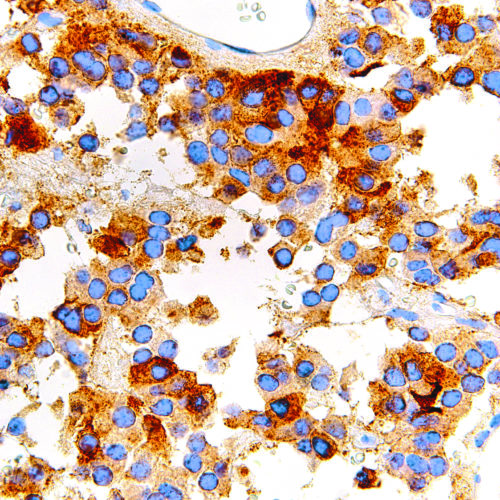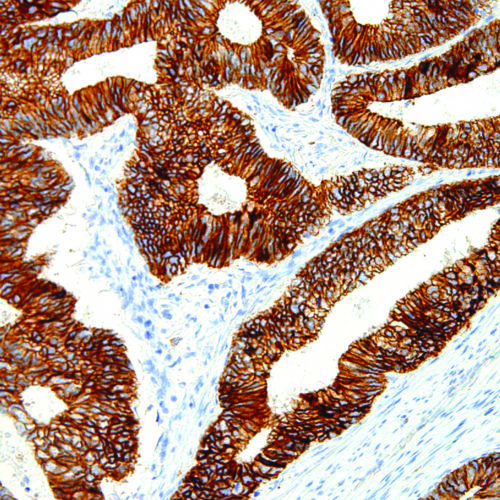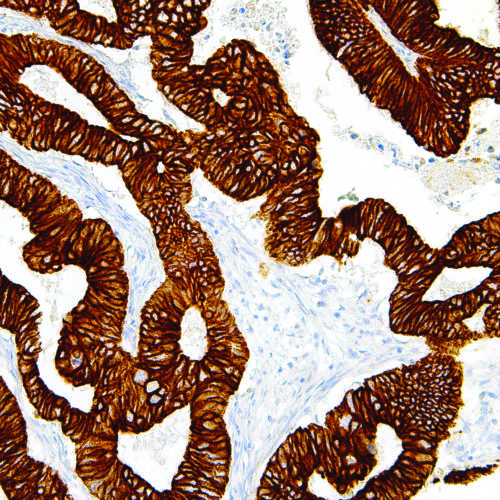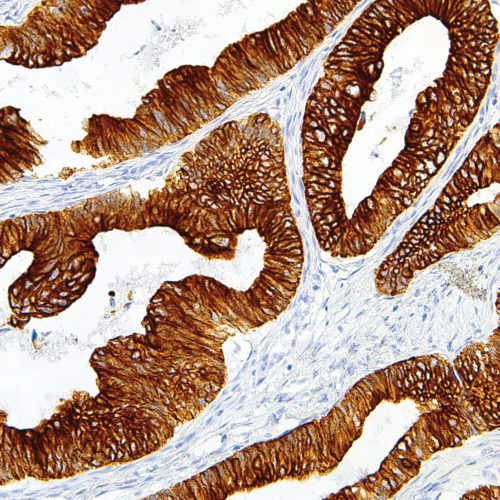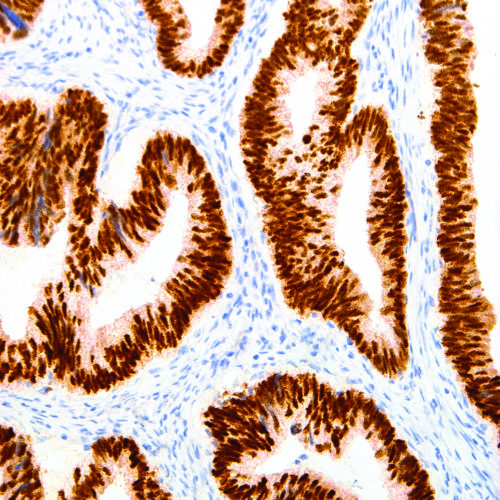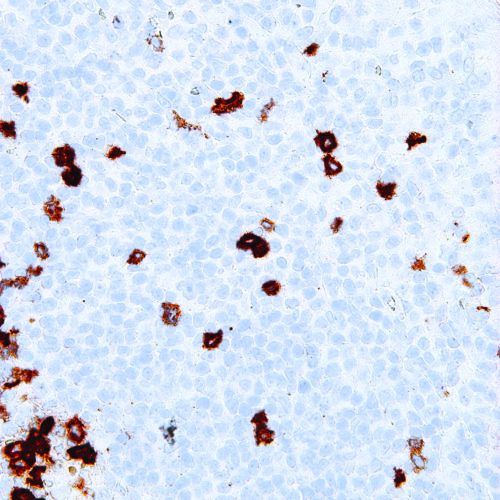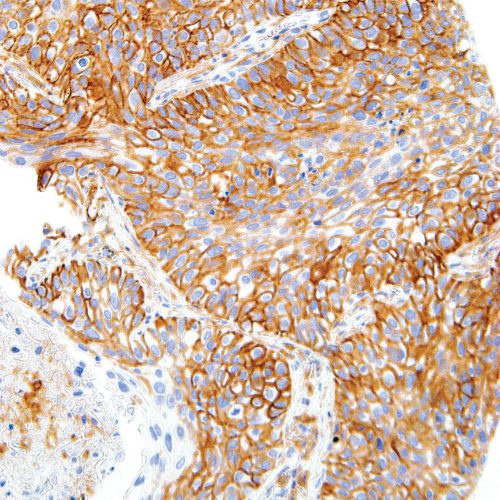High quality products to support Pathologists and Biological and Environmental Scientists
GeneAb™ GATA3
$129.00 – $639.62GATA3 is a transcription factor important in cell proliferation, development, and differentiation. GATA3 is mostly observed in breast and urothelial carcinomas, and rarely present in other cancers such as endometrial endometrioid adenocarcinoma. Among the breast carcinomas, GATA3 has a lower expression in luminal B subtype breast carcinoma. Studies have found GATA3 expression to be associated with ER (estrogen receptor), PR (progesterone receptor), and Her2 in breast cancer cases. Urothelial carcinomas stain positively for GATA3 in invasive or high grade tumors, therefore Anti-GATA3 is useful for carcinoma diagnosis when breast and bladder are plausible.
GeneAb™ FSH
$118.25 – $494.50Follicle-Stimulating Hormone (FSH) allows for progression of ovarian folliculogenesis, and enables Sertoli cell proliferation in the testis. Anti-FSH reacts with FSH-producing cells, therefore FSH staining is useful for classifying pituitary cancers and understanding pituitary disease.
GeneAb™ E-cadherin
$102.12 – $419.25E-cadherin is an intercellular adhesion molecule present in epithelial cells. Anti-E-cadherin stains glandular epithelium, as well as lung, gastrointestinal and ovarian adenocarcinomas. A panel of antibodies against E-cadherin and p120 is also used to differentiate ductal (membranous staining) and lobular breast cancer (cytoplasmic staining). Anti-E-cadherin also stains some thyroid cancers.
GeneAb™ Cytokeratin 19
$69.88 – $268.75Cytokeratin 19 (CK19) forms intermediate filaments found in the intracytoplasmic cytoskeleton of epithelial tissue and provides mechanical support. Anti-Cytokeratin 19 stains epithelia and epithelial malignancies such as carcinomas of the colon, stomach, pancreas, biliary tract, liver, and breast. Cytokeratin 19 is a useful marker for distinguishing hepatocellular carcinoma from intrahepatic cholangiocarcinoma. This differentiation is improved when stained in combination with Cytokeratin 7, CAM5.2l, Ber-EP4/MOC31, HepPar1 and TTF1. Cytokeratin 19 staining can also be used to recognize thyroid papillary carcinomas.
GeneAb™ Cytokeratin 18
$64.50 – $258.00Cytokeratin 18 (CK18) is present in simple, glandular, and transitional epithelial cells, but is absent in stratified epithelial cells. CK18 usually multimerizes with Cytokeratin 8, and Anti-Cytokeratin 18 is useful for detecting adenocarcinomas of simple and glandular epithelium origin, as well as poorly differentiated squamous carcinoma cells.
GeneAb™ CDX-2
$91.38 – $682.62CDX-2 is a caudal-related homeobox transcription factor that is expressed by intestinal epithelial cells. CDX-2 is a useful marker for gastrointestinal carcinoma, and for determining the origin of gastrointestinal metastatic adenocarcinoma and carcinoids. Anti-CDX-2 is used for differentiating lung and metastatic colorectal adenocarcinoma, however mucinous ovarian carcinoma also react positively with Anti-CDX-2, thereby limiting the ability to differentiate from metastatic colorectal adenocarcinoma.
GeneAb™ CD57
$75.25 – $268.75Cluster of differentiation 57 (CD57), also known as NK-1, is an antigen detectable in natural killer cells, some T-lymphocytes and normal peripheral blood mononuclear cells, myeloid cells, and a variety of polypeptides, lipids, and chondroitin sulfate proteoglycans. CD57 is indicated as a marker for tumors of neuroendocrine origin, including pheochromocytomas, paragangliomas, carcinoid tumor, and medulloblastomas, as well as various neural tumors including neuromas, neurofibromas, schwannomas, and granular cell tumors. CD57 is also detectable in ganglioneuroma and prostate carcinoma. Anti-CD57 is used to distinguish nodular lymphocyte-predominant Hodgkin’s lymphoma from T-cell/histiocyte-rich large B-cell lymphoma, nodular sclerosis Hodgkin’s disease, and follicular lymphoma.
GeneAb™ CD44
$48.38 – $172.00Cluster of differentiation 44 (CD44) is a glycoprotein receptor for hyaluronic acid, which plays a fundamental role in cellular adhesion, stromal binding, migration, and cell-cell interactions. Studies have suggested that the CD44-hyaluronate interaction is central to tumor invasiveness. Positive staining with Anti-CD44 is implicated in a multitude of different cancer types, including breast, prostatic, renal cell, colonic, hepatocellular, and genitourinary carcinomas, as well as Non-Hodgkin’s Lymphoma, metastatic melanoma, gastric cancer, and some soft tissue tumors. It has also been demonstrated that there is a positive correlation between tumor progression and increased expression of CD44v, a high molecular weight CD44 isoform that has been described in epithelial cells. Given the expression of CD44 in a wide range of cancers, the most practical application of CD44 immunostaining is its use in discriminating between urothelial transitional cell carcinoma in situ from non-neoplastic changes in the urothelium.
